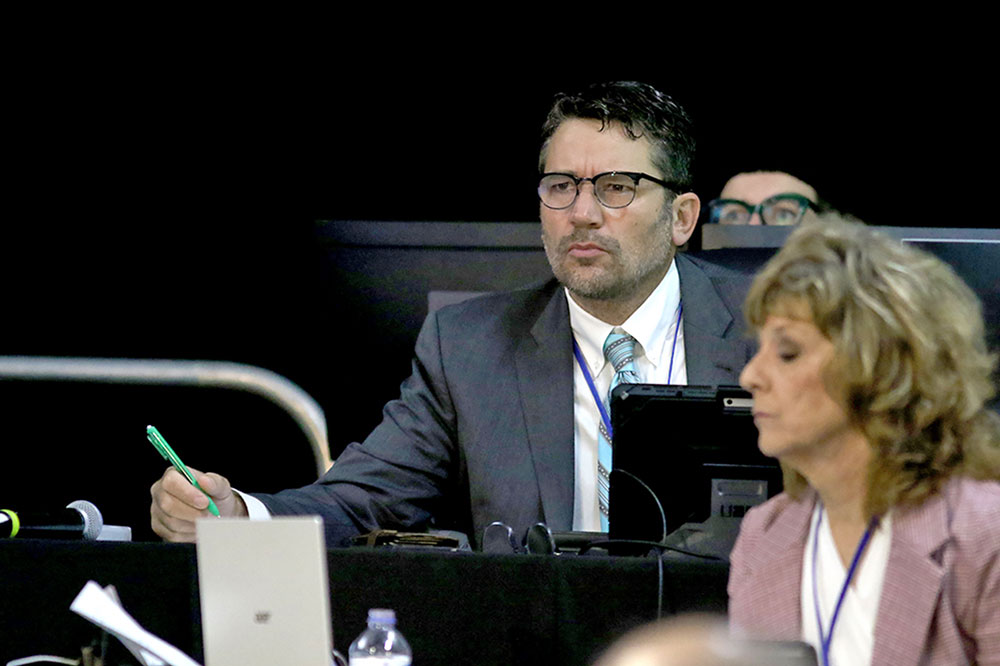Floyd County considers new CAFO strategy
By Chris Baldus, cbaldus@charlescitypress.com
Floyd County is considering a new strategy to rein in objectionable aspects of confined animal feeding operations.
The intent is to make applicants seeking to build the livestock operations that annually cycle thousands of pigs, cattle or chickens through concentrated feeding facilities meet more stringent standards to earn points on the master matrix evaluation system used by the state to determine where such facilities can locate.
Floyd County last month joined an effort by other counties asking the Legislature to revisit the “failings” of the master matrix, which applicants must score half of the 880 available points to earn a passing grade.
On Tuesday, Supervisor Mark Kuhn introduced a resolution to the County Board setting standards for wellhead protection that would need to be met by applicants to earn certain points in the evaluation.
“It doesn’t take into consideration the whole entire failings of the master matrix,” Board of Supervisors Chairman Doug Kamm said, noting that applicants can simply skip over the affected topics and earn enough points elsewhere to gain state approval for their sites.
The move does not exceed the county’s authority, said Kuhn, who communicated about it with the Iowa Department of Natural Resources coordinator of animal feeding operations, Gene Tinker.
“I think Floyd County needs to take every precaution we can to protect our precious drinking water and the air that the residents near a CAFO breath,” Kuhn said.
This is the second of three promised resolutions Kuhn intends to introduce related to confined animal feeding operations. It require metal posts be put up around wellheads and monitoring wells if an applicant wants to score points in the matrix on those topics. The bollards will protect the wellheads from being accidentally damaged by manure trucks, for example.
“If there is a well located on the CAFO and is in a position that it could be hit or damaged during any time that semitrailers and trucks are bringing pigs in and out, feed trucks are … in and out — tractors with implements are often in this area, the fields are right up next to them in many cases — they must meet our standards to protect that well from damage and possible contamination,” Kuhn said.
The resolution also sets a standard for truck turnarounds on CAFO sites.
Supervisor Linda Tjaden said she also communicated with Tinker asking about past use of this authority to set standards that affect the matrix scoring.
“There are portions of the matrix that there isn’t much that we can do (about) just because of the way it’s stated, but there are some areas that (are) allowing some of the counties to add a standard of their own,” she said. “And when asked, ‘Why is it others have not done it?’ His comment to me was it takes time and effort. And everybody’s got a lot on their plate … It’s just never been thought about from that perspective.”
There are other topics in the matrix for which counties likely can set standards, but the one’s he chose to address have come up in Floyd County cases, Kuhn said.
Prior to Kuhn introducing the resolution Tuesday, the board approved Kuhn’s first resolution establishing a policy to require applicants seeking a construction permit from the state for a confinement animal feeding operation to attend a county public hearing. It included requirements for the county to inform the applicant of the date of hearings.
The board intends to consider this second resolution for review and possible action at its next meeting on March 14.
Other than media, Randy Heitz of the Floyd County Farm Bureau was the lone member of the general public attending during the board’s discussion of the resolution.
Resolution language dispute
There was no debate among the supervisors on the merits of the new resolution. However, the board spent about 40 minutes dealing with language changes in the resolution regarding background.
Kuhn objected to County Auditor Gloria Carr’s editing of that background and said he did not receive an e-mail she said she sent to see if he was OK with the changes.
“I just don’t think it’s the duty of the auditor to change a resolution being proposed by the board if she thinks the language is unclear,” he said.
It’s a point he made multiple times during the discussion, leading Chairman Doug Kamm to tell him to “Let it go.”
Carr said she was only trying to clarify and make language consistent with how resolutions have been drafted in the past.
“I was trying to assist, I was not trying to sabotage anything,” Carr said.
In the end, some changes were accepted in the resolution, including striking of a paragraph regarding the lack of attendance in the past of applicants to hearings.
–20170303 —








Social Share